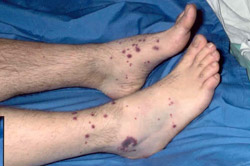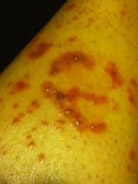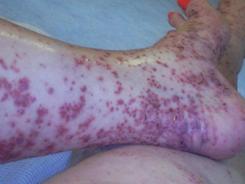Professor Alan Salama
Professor of Nephrology and Honorary Consultant Nephrologist
Royal Free Hospital London
Updated in February 2024 by
Professor Jonathan Barratt
University of Leicester
What is IgA vasculitis?
IgA vasculitis, previously known as Henoch-Schönlein Purpura (HSP), is a systemic vasculitis which can affect the skin, joints, bowel and kidneys.
IgA is a form of antibody that we all make, to protect the lining of the airway, throat, and gut. This is why bouts of IgAV often follow infections in the throat, tonsils or bouts of gastroenteritis. If IgA gets stuck in the smaller blood vessels it causes inflammation (vasculitis). Sometimes IgA will get stuck in the small vessels in the kidney and is called IgA vasculitis nephritis (IgAVN), which is characterised by blood and protein in the urine. The blood can be visible and the urine often looks like tea or coca-cola urine, but in some may only be detectable with testing in the clinic. The amount of protein in the urine is an important risk factor for how the kidneys will fare in the longer term.
Who are affected?
IgAV often affects children, but can affect adults of all ages. It often follows an infection, which is frequently tonsillitis in younger patients, a throat or chest infection, or a bout of gastroenteritis. It affects both sexes equally. Half the children affected are under the age of five. Kidney involvement is more likely to be severe in older children and adults. In adults delays in making the diagnosis mean that many have more advanced kidney disease when the diagnosis is finally made.
IgAVN has very similar appearances in the kidneys to IgA nephropathy which was previously known as Berger’s disease and should not be confused with Buerger’s disease which is a different type of vasculitis.
What is the aetiology (cause)?
The cause of IgAV is not yet known. However, in IgA nephropathy (which affects the kidneys only) there are differences in the make-up of the IgA antibodies in patients that give them a tendency to get stuck in the kidney. It is believed that similar abnormalities may underlie IgAV. Infections are often a trigger for bouts of IgAV, which can lead to skin and urine abnormalities a few days after the infection begins.
What are the symptoms?

Symptoms occur over days or several weeks. A widespread rash is common mainly on the backs of the legs, buttocks, trunk and back. The rash is caused by inflammation in the small blood vessels of the skin which can cause bleeding into the skin. It is often felt as small bumps (palpable) and is a reddish/purple colour (purpura). In severe cases it can cause large areas of raised purple patches and skin ulcers.


Other common symptoms are painful joints, stomach and tummy pains and sometimes bleeding from the bowels. Bowel symptoms may be severe and can present as a severe appendicitis. If the kidneys are involved there will be blood, which can be visible( macroscopic) or only found on dipstick testing(microscopic) as well as protein in the urine. If the protein loss in the kidney is extreme, swelling of the feet and legs can occur. Not everyone gets all these symptoms, but the rash is a common accompaniment to other organ involvement.
Making a diagnosis
As with other types of vasculitis there is no single specific test. The diagnosis depends on the doctor recognising the pattern of symptoms and findings on examination. Blood tests may show evidence of inflammation. There may be a raised level of immunoglobulin A (IgA) in the blood, but only in about a third of patients. If the skin, bowel or kidneys are affected then a biopsy may show immunoglobulin A(IgA) antibodies present in the tissue; this is a definitive test and a positive biopsy helps confirm the diagnosis; however, a negative biopsy does not rule out the diagnosis. Skin biopsies will frequently show a leucocytoclastic vasculitis( meaning lots of white blood cells in the skin around small blood vessels) and the biopsy needs to be sent off to have a special test to find the IgA antibodies in the skin. In the case of bowel involvement a CT scan may be performed that shows signs of bowel inflammation.
Treatment
No specific treatment is needed for most cases of IgAV in children or adults with the symptoms resolving spontaneously over time. Anti-inflammatory drugs (such as ibuprofen) are often prescribed for the joint pains, unless there is kidney involvement. There is some evidence that steroid treatment may lead to more rapid improvement of bowel symptoms in children, as well as clearing up the rash. Skin disease may also be treated with drugs such as dapsone. If the kidney is involved and there is inflammation in the kidney or if there are severe bowel symptoms then treatment with steroids or other immunosuppressants may be needed to reduce inflammation. Long term protection of kidney function may require certain blood pressure lowering drugs( see below). If blood pressure is raised as a result of kidney disease, salt should be avoided and blood pressure tablets may be added.
Drugs and Side effects
For information on the main drugs prescribed for IgAV see:
- Steroids
- MMF
- Azathioprine
- Angiotensin converting enzyme inhibitors, Angiotensin receptor blockers
- Dapsone
- VUK Glossary of Drugs
For information on other drugs used in the treatment of vasculitis see Glossary of drugs and side effects.
Prognosis
Although relapses are quite common they are mostly mild and self-limiting and affect the skin. Sometimes frequent relapses of prolonged bouts can be treated with combinations of steroids and immunosuppressives such as azathioprine or mycophenolate mofetil (MMF). Cyclophosphamide has also been used. Usually the disease stops re-occurring as patients get older. However, some adults can present with new IgAV having never experienced it in their youth. As with all forms of inflammation, there may be complete resolution or there may be scars that form – on the skin or in the kidney. These are not repairable and are associated with some loss of function- this is why recurrent bouts of IgAV can lead to progressive kidney damage and your doctors will monitor your kidney function, presence and quantity of blood and protein in the urine. If there is a lot of protein leaking out, you may be asked to start a drug called an Angiotensin converting enzyme inhibitor (ACE) inhibitor ( ending in …pril, such as enalapril, ramapril) or an angiotension receptor blocker (ARB)(ending in …sartan, such as irbesartan, losartan). These are blood pressure lowering drugs that are especially good at lowering protein leaks from the kidney and reducing the rate of decline in kidney function. In older patients kidney function may have been severely damaged and dialysis may occasionally need to be initiated. This is rarer in children.
Key Points
- Children and adults can be affected by IgAV, but it is more common in children.
- The disease may be present for months or years before a diagnosis is made
- Treatment depends on the severity and relapsing nature of the disease, as well as the degree of organ damage that may exist
- The disease commonly relapses after the initial treatment
- Kidney disease may be more severe in older adults
Related Vasculitis Articles
- HSP Guidelines – 2012
- Fertility and Vasculitis – Dr David Jayne
- Vasculitis and Children – Dr Paul Brogan
Further reading
- Henoch-Schönlein Purpura – Brian V Reamy, Pamela M Williams, et al
- Small Vessel Vasculitis – Paul Brogan, Despina Eletheriou, Michael Dillon
